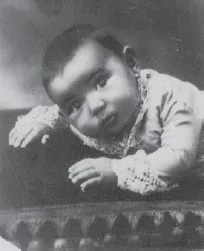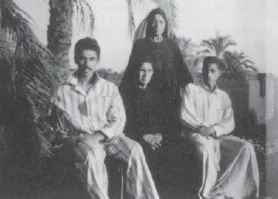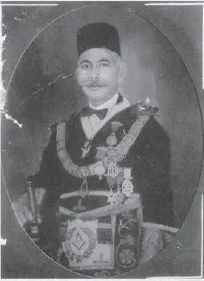![]()
1
Allah And McDonald’s
Since January 1993, I have been in this small house overlooking Duke Forest with its dense masses of tall cedars, pines and oak trees: an inundation of green. The sight is not a familiar one to me. The word ‘forest’ is strange to the ears of a woman who has spent her life in Egypt: the valley of the Nile, the tranquil river, its waters slipping by, never overflowing, never flooding, the ribbon of green fields winding through the yellow sands, shrinking as the desert and concrete walls close in on it from every side.
In front of my home in Giza, there was a tree (Giza is as-sociated in the minds of tourists and Egyptologists alike with pictures of the Pyramids, the Sphinx, the tombs of the pharaohs like Tutankhamon, and with the camels and donkeys that the tourists ride guided by the mischievous local children, whose faces are scorched by the sun, their heels cracked and black as they walk along under the admiring gaze of the tourists, who want to see so-called differences of race and culture). I used to open my window and look out at this solitary tree. My eyes are drawn to green, my lungs breath it in. Green is converted in my lungs to oxygen.
I spent my childhood and my youth in the countryside, in the heart of the Delta, moving between my village Kafr Tahla in Al-Kalyoubeya province and the town of Menouf in Al-Menoufeya province. My eyes became used to seeing fields of crops, and orchards. My chest seemed to expand, to open up in order to embrace the green expanses reaching out before my eyes.
One day during the year 1977, I opened my window. The lonely orphan tree was no longer there. A bulldozer had come along and uprooted it. Two concrete walls started to rise until they blocked out the sunlight from my window. Over one wall rose the tall minaret of a new mosque bathed in the white of neon lights. Over the other hung a billboard for McDonald’s surrounded by revolving neon lights. On the ground floor appeared other circling lights for something new called Disco Club.
I started to keep my glass windows and wooden shutters closed day and night, but the din of noise and the pulsing lights kept going through my body, mingled with the smell of hamburger, the thump of disco beats and the cries of ‘Allah is most great… Come to prayers.’
During the painful sleepless nights, I wondered whether there was some pact between Allah and McDonald’s to chase away the sleep heavy on my lids, or drive me out from where I lived.
Duke Forest is a flood of vivid green trees. My eyes seek their colour like dry soil seeks water. The sun comes through my window as I sit writing. Two years have gone by in this remote place almost ten thousand miles from Egypt, where Duke Forest is part of the university in this small village-like town called Durham in North Carolina, on the east coast of the Atlantic Ocean.
I raise my head bent over the paper, put down my pen for a moment. Why am I writing this autobiography? Is it a longing for my past life? Is my life over, or is there something of it left? Are words the last resort when one wants to hold on to what has passed by in life before it is gone forever? To fix images in one’s memory before they vanish and can no longer be replaced? To struggle against death, to exist now, or even forever?
When I was a child, when I was still young the word eternity held for me a magic, like that of the gods. Now its spell has gone. The very word makes me impatient. Things that never end are only boring, and were it not for death, life would be an impossible burden.
Am I trying to discover what is buried deep down inside me, to reveal what is hidden through fear of God, the father, the husband, the teacher, the male or female friend or colleague, through fear of the nation to which we belong, or those we love?
It is normal when we show anger and rebel against those whom we hate, but when our anger and rebellion are directed against those whom we love, what will the words be like when we express them in writing?
When I was a child, the word God for me meant justice or freedom or love. How did it become a sword over my head, or a veil over my mind and face? I sang songs to my nation, to my country in my childhood and my youth. How has my country become a prison, or a policeman wearing a fez, a skull cap, a turban or a hat, speaking English, or classical or colloquial Arabic, or a dialect from the Gulf states as he pursues me day and night?
With other girls I sang of love. On moonlit nights, we would sing of love all night. How did the word love become the four blackened walls of a kitchen in a falling house called the matri-monial home? And medicine too, and science or art or literature, words I dreamt about like a small bird dreams of flying, how have these words become chains that drag me to the ground or under its surface?
From the day I was born until the age of sixty I lived in Egypt. When I try to recollect what happened when I was born, all I know is that I was born a female. I heard people say God creates the male and the female, that long before I was born female infants were buried alive. Then a verse descended in the Qur’an from above, which said: ‘And if the infant girl who has been buried alive is asked for what sin was she killed…’ I could have been one of those infants who were buried alive had I been born at that time. This is what I heard people say to me when I was four years old.
Nawal El Saadawi, aged two months, in Egypt 1931.
But I was born in better times. Nothing happened to a female when she was born. Life just came to a standstill. People were simply sad, and sorrow is easier to bear than infanticide. The sorrow might conceal a latent desire to bury the female infant, but it remained sorrow, just a darkness of the face, masking what is repressed beneath.
During the first days of her life the female infant does not see this sadness. Her eyes which open for the first time on this world are too young, too innocent, unable to see the hidden.
I was one of those female infants. Like them I did not take in the scene with my own eyes. The original images were not registered in my memory. I have tried to retrieve them in my imagination through the words I seem to have heard from my grandmother, and with which I have painted a description of those sad moments when I emerged from my mother’s womb.
![]()
2
The Cry in the Night
With the first light of dawn creeping through the night of that month of October, before the sun came up over the piece of land demarcated by a speck on the map almost invisible to the eye on the curving line, fine as a hair, known as the Nile, which pushes its way through desert sand, from south to north, and with the last stroke of four dropping like a dying gasp from the ancient clock on the wall, rose a cry, coming from the four-poster brass bed pushed up in a corner of the innermost room in the house, the cry of a woman in labour which went through the night just once. Then there was a long heavy silence, as though both the woman and the child had died.
In the hall, the throng of people gathered outside held their breath. First, the family of Shoukry Bey, noble descendants of a lineage going back to the great Tala’at Pacha of Istanbul. Then the family of Al-Saadawi, from Kafr Tahla, with their dark, dusty faces, and the bare skin of their cracked heels looking out from under the hem of their long garments. The smell of mud and sweat in the threadbare gallabeyas, the long robes worn by peasants, mingled with the sweet scent of French perfumes in the flowing silk dresses and the smell of whiskey and dark tobacco rising from the foreign cut suits made of English wool.
My peasant grandmother Sittil Hajja, my father’s mother, in 1947 in the village of Kafr Talha.
All sound stopped in the narrow hall, even the sound of breathing, or the early whiffs of the creeping dawn, reluctant to advance, unable to go back, even the exhausted ticks of the old rusty clock handed down from the era of the Khedive Ismail. The sun too refused to come out, as though held back in the entrails of the earth.
Perhaps such a moment seems unreal, but that is what happened as told to me by my grandmother Al-Hajja* Mabrouka, the mother of my father, whom we addressed as Sittil Hajja.
Her breathing also stopped, held back in her throat closed tight after the first and only scream died out. She looked into the room through the door, left slightly ajar, and suddenly glimpsed the small round head showing through the slit, wedged up between the thighs, refusing to come out. An obstinate head, hard as stone, dark as night, round as the earth, resting motionless in the wide open vaginal slit, stretched to its limits, to a complete circle like the setting sun, as red as clotting blood.
But after that one and only shriek rising from the innermost depths of the mother lying on the bed, the dark obstinate head thrust out slowly, gently, then stopped again, held back at the neck, undecided whether to continue on its way out, or go back. But the muscles of the vagina contracted tightly round the neck, threatening to throttle out its life. There was no way for this being to save itself except to go out into the world as quickly as it could.
And so it did, curled around itself like a ball, like a porcupine, its arms and legs wound around its body. Two broad, horny palms caught the rounded head in their grasp, long sinewy fingers pushed the straining thighs apart. As quick as lightning, and as hard as rusty nails, the hands of these dayas had been trained to do so ever since the Turkish occupation.
The two small thighs of the newly born baby were held tightly closed, one against the other, with a force which seemed almost superhuman. It was as though between them lay something which had to be hidden, something which was a source of shame. But the steely fingers of the daya pushed one thigh away from the other as if they were the legs of a chicken, eager to reveal whatever good or evil lay hidden between them, to be the first one who would let out a screaming ‘Yoo-yoo’ if her eyes fell on a penis (‘May the name of the Prophet protect and guard it’), if she glimpsed the sacred organ bestowed by Allah on males alone, or to be the first to lower her head, show a solemn face, and become as silent as the dead if all she could find was a cleft – that unhappy vaginal opening accursed in this world since sinful Eve.
No yoo-yoo of joy shrilled out from the mouth of ‘Um* Mahmoud’ the daya, no eyelid was lifted by the mother to glimpse the thing born of her that night. I happened to be that thing which the daya turned over between her hands sucking at her lips with a sound of deep regret before she let it drop to drown in the basin full of water.
No one from the family of Shoukry Bey or the Al-Saadawi kin stretched out a hand to save me. They probably all disappeared into thin air, leaving me to the hands of Um Mahmoud, that daya trained over centuries of time to deal with such catastrophes. She had feelers that detected the unspeakable things lurking in the eyes. The newborn female child would live or not, for all depended on God’s will, and she was on good terms with God, and knew his will. Did He not visit her when she slept, just as He had visited the Prophet and the Holy Saints? Did He not reveal to her what was hidden to others so that she was able to tell the sex of any infant, as it lay inside the womb? Did not God guide her hand as it felt its way up, to pull out the child, so that at times the cord would twist around the little neck and throttle out its life, or it would bleed and bleed until no drop of blood remained and the little female body let out its final breath. Did not, did not, did not… So many things could happen, and all were willed by God. No one could challenge Allah’s will, except the wicked Satan.
My mother did not open her eyes. She left me to kick inside the basin. I do not know how I foiled death during the first moments of my life. Maybe a Satanic will took hold of me. At the time I did not know who Satan was. At the age of five I was told his name was Eblis, that he was the only one who had possessed the strength to disobey Allah’s commands, and wave the banner of rebellion in his face.
Maybe my mother opened half an eye (after the daya left). The moment she saw my brown complexion with a tint of indigo in its depths like those of the peasants in the Al-Saadawi family, she closed her lids as though forever, pressed her lips tightly together until the blood in them turned blue. Silence reigned, a silence heavier than the earth itself. It crept out of the small house, to the whole village huddled beneath the banks of the Nile, then on to the capital city Al-Kahira (Cairo, the triumphant) the oppressor of its people since way back in time, since the age of slavery, the oppressed by the guns and bayonets of many invaders until the 1882 British occupation. The giant city that lay below the Mokattam Hills, the pyramids, the tomb of the pharaoh, the outstretched feet of the giant Sphinx, the greatest of all gods in stone.
My mother’s father, Shoukry Bey, before his death in 1945.
The mother of the newborn child shut her eyes and curled up around herself like an embryo, pressing the soft flesh of her white thighs over the open bleeding cleft. Her arms did not stretch out to enfold me, to hold me to her breast. She left me to shiver by her side wrapped in an old rag so tight around my belly and chest that I almost suffocated, and went into a kind of daze, a feverish state where the pain and bleeding took her back to her wedding night. She advanced to the beat of drums, at a slow, heavy pace, her feet stumbling over the high tapering heels of her shoes, catching into the tail of the long wedding gown with its cascades of folds and frills. The drum beat into her ears like hammer blows. Her thighs trembled as she pressed them tightly over the cleft between them, shorn of its pubic hair, of pride and self-respect. She was fifteen. Her father had chased her out of school with a stick. Her bridegroom was sixteen years older than she was. All she had seen of him was his back, as she peered through the slats of the window shutters. Her face under the white coating of powder was as white as chalk, and under the electric light it took on a shifting sickly, yellow hue. Her high cheekbones were painted bright red like the sugar dolls of the Moulid.* Her honey-coloured eyes shone with a childish gleam and the pupils turned round and round like mice in a trap searching for a way out. Her name was printed on the invitation card in black ink:
Miss Zeinab Hanem† Shoukry, the dutiful daughter of
the most Honourable Mahmoud Bey Shoukry,
Director General of Military Conscription
to be married to Al-Sayed Effendi Al-Saadawi,
the teacher in the Ministry of Education.
The wedding ceremony will be on the evening of
25 March 1929, in the residence of
Shoukry Bey, Villa No. 6, Zeitoun Street,
Zeitoun Hamlet, Suburb of Cairo.
Her memory stopped all of a sudden with her feet, as she came to a halt on the threshold of the bedroom. She could see the yellow brass bed with its four posts and a tall, broad-shouldered man standing upright like one of the posts. She had never seen his face before. From behind the shutters she could glimpse only the back of his thick neck, its hair shaven with a razor blade, his...



